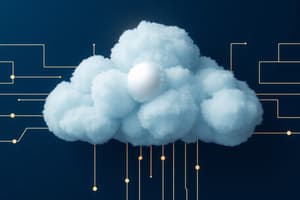Podcast
Questions and Answers
What is an advantage of using virtual machines?
What is an advantage of using virtual machines?
- Limited access to operating systems
- Increased hardware costs
- Reduced scalability
- Easier creation and backup of machines (correct)
What is a concern of cloud-sourcing?
What is a concern of cloud-sourcing?
- Easy local IT management
- Rapid scalability
- Performance and reliability (correct)
- Unlimited storage capacity
What is a benefit of cloud storage?
What is a benefit of cloud storage?
- Permanent storage of data on local devices
- Higher costs for data storage
- Limited access to data storage
- Temporary caching of data on local devices (correct)
Why is cloud-sourcing becoming important?
Why is cloud-sourcing becoming important?
What is an advantage of virtual machines in software testing?
What is an advantage of virtual machines in software testing?
What is a benefit of cloud-sourcing in terms of scalability?
What is a benefit of cloud-sourcing in terms of scalability?
What is a concern of cloud-sourcing in terms of data?
What is a concern of cloud-sourcing in terms of data?
What is a benefit of virtual machines in terms of operating system compatibility?
What is a benefit of virtual machines in terms of operating system compatibility?
What is a benefit of cloud-sourcing in terms of IT management?
What is a benefit of cloud-sourcing in terms of IT management?
What is a characteristic of cloud storage?
What is a characteristic of cloud storage?
Flashcards are hidden until you start studying
Study Notes
Cloud Security
- Infrastructure Security: Protection of hardware, software, and networks associated with cloud services.
- Data Security and Storage: Safeguarding data from unauthorized access and ensuring secure storage solutions.
- Identity and Access Management: Managing user identities and regulating access to resources based on authentication and authorization.
- Access Control, Trust, Reputation, and Risk: Mechanisms to ensure that users gain appropriate access, and risk assessment processes to maintain cloud security.
Case Study and Simulations
- Open Source and Commercial Clouds: Examination of the differences, benefits, and limitations of open-source versus commercial cloud solutions.
- Cloud Simulator: A tool for testing and evaluating cloud environments and service delivery models.
Research Trends
- Cloud Computing: Ongoing advancements and applications in cloud technology.
- Fog Computing: Extending cloud capabilities to the edge of the network closer to data sources.
- Distributed Computing: Leveraging multiple computers to process data simultaneously across a network.
- Grid Computing: Coordinating resources across networks of computers to work on common problems.
- Cluster Computing: Grouping computers to work together while presenting a single system to users.
- Utility Computing: Offering computing resources as a utility service, similar to water or electricity.
Centralized vs. Distributed Computing
- Uni-Processor Computing: Centralized computing utilizing a single processor for operations.
- Distributed Computing Definition: A field of computer science focused on solving problems using distributed systems composed of multiple autonomous entities with local memory.
Characteristics of Distributed Systems
- Communication: Processes communicate via message passing over various communication lines (e.g., high-speed buses, telephone lines).
- Applications: Examples include Facebook and the Large Hadron Collider (LHC) for data processing.
Robustness
- Single Point of Failure (SPOF): Distributed systems are designed to avoid SPOF; other nodes can take over tasks from failed nodes.
Performance Factors
- Nature of Applications: Distributed computing supports both computing-intensive and data-intensive applications.
- Computation of Pi: Example of heavy computational tasks, such as Monte Carlo simulations that benefit from distributed processing.
Distributed Applications
- Application Structure: Consist of processes distributed across machines, working collaboratively to solve common problems.
- Client-Server Model: Historically centralized resource management, where clients interact with individual servers.
- Peer-to-Peer Computing: Represents a shift towards more decentralized applications where each node can act as both client and server.
Studying That Suits You
Use AI to generate personalized quizzes and flashcards to suit your learning preferences.




